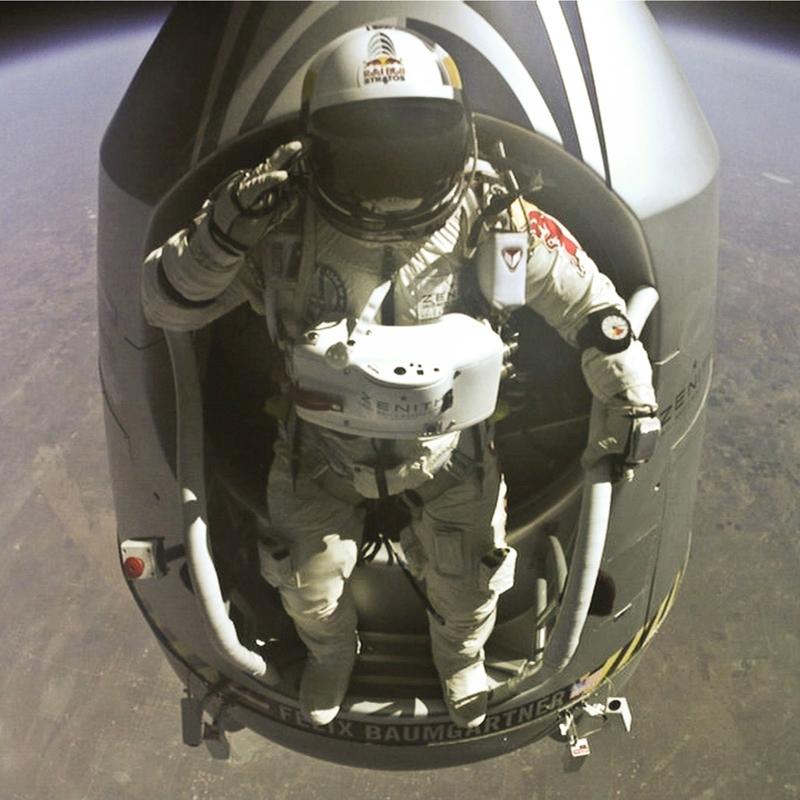BOB GARFIELD: This week daredevil skydiver Felix Baumgartner broke the sound barrier - and world records - when he jumped in free fall from 24 miles above the earth’s surface. Viewership of the jump also broke records, with the live streaming of the event on YouTube garnering eight million simultaneous viewers, which blew YouTube's previous record of 500,000 simultaneous viewers out of the stratosphere.
But some criticized the jump as a mere publicity stunt for its corporate sponsor Red Bull Energy Drink. In 2010, Esquire Contributing Editor Luke Dittrich spent several weeks with Felix Baumgartner and the Red Bull Strato Team. Luke, welcome to On the Media.
LUKE DITTRICH: Thanks for having me.
BOB GARFIELD: The word “publicity stunt” has been invoked, and I guess it was that but, as you reported in Esquire, so very much [LAUGHS] more.
LUKE DITTRICH: It was definitely a spectacular stunt, but it does have real world relevance now, and there are a lot of people at NASA and in the US Navy who were watching it very carefully. Once I started looking into it, what really got me excited about this story was meeting with Dr. Jonathan Clark who is the medical officer for the Red Bull Stratos Project. Dr. Clark had a long history with NASA, and his wife was an astronaut, Laurel Clark. She tragically died in the Columbia disaster.
BOB GARFIELD: This was the shuttle that broke up during reentry into the earth’s atmosphere, killing everyone aboard.
LUKE DITTRICH: Dr. Clark consulted for several years afterwards on NASA's assessment of that disaster to help prevent something like that in the future. Dr. Clark's work now for the Red Bull Stratos Project is kind of an extension of this quest to make spaceflight safer.
BOB GARFIELD: How has it come to pass that the space agency has ceded [LAUGHS] the research responsibility to Red Bull?
LUKE DITTRICH: There is this strange tension and possibly transition from old space to new space, old space being the government-driven NASA program and new space being Red Bull Stratos and SpaceX and all sorts of commercially-driven aspects of the space program that are beginning to come online. While a Red Bull Stratos isn't necessarily the most significant of the new space endeavors, it seems to have made the most impact. I think that has a lot to do with the fact that it involves an actual human being doing something breathtakingly brave.
BOB GARFIELD: Not to trivialize the notion of courage, but it took some courage [LAUGHS] for Red Bull to associate itself with a feat that could easily have gone in a very different direction. I mean, just tell me about the physiology of exposure to supersonic speeds at such high altitude.
LUKE DITTRICH: There have been many people over the years who have tried to do this and many died, including a, a Russian named Piotr Dolgov who, while exiting his pressurized capsule smacked his visor on the door, created a small crack and that was all it took.
The human body is just completely unable to cope with the altitudes that Felix was at. His blood literally would have begun to boil, were he exposed to that atmosphere. And once he jumps, one of the big unknowns was whether or not he was going to be able to maintain any sort of control while falling through that thin, thin, thin air. If he had fallen into an uncontrollable flat spin, it's quite likely that he could have died. They’ve done tests on monkeys where they’ve strapped them to rotating platforms and spun them around at high speeds. And at approximately 145 RPM, they’ve discovered that their brain stems tend to separate from their spinal columns.
BOB GARFIELD: This particular episode worked out beautifully for all involved, but can we trust commercial interests to be exploring the final frontier in the space program or anywhere else?
LUKE DITTRICH: I think it's premature to say that they'll be exploring the final frontier. As impressive as the Red Bull Stratos Project was, it’s a long way, both in terms of technology and impact, from, for example, the latest Mars Rover. I don't necessarily see NASA partnering with McDonald's at anytime soon, but you can certainly imagine a future in which some brilliant engineers working outside of the government, and they figure out a much more efficient way to say get to the moon.
BOB GARFIELD: One small step for man, one giant leap for Nike Air Pegasus.
LUKE DITTRICH: [LAUGHS] Yeah.
BOB GARFIELD: Luke, thank you so much.
LUKE DITTRICH: Oh, thank you.
BOB GARFIELD: Luke Dittrich is a contributing editor at Esquire Magazine.
[MUSIC UP AND UNDER]

